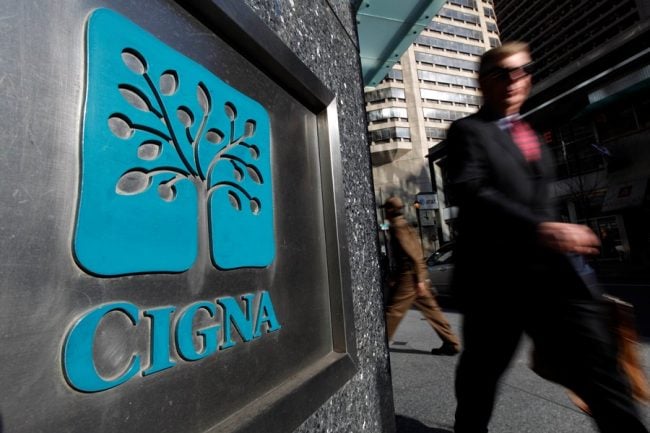 Cigna announced last week that it would pay $54 billion for Express Scripts, the latest major move in the health care sector. (Photo: AP)
Cigna announced last week that it would pay $54 billion for Express Scripts, the latest major move in the health care sector. (Photo: AP)
Industry reaction is mixed on whether Cigna Corp.'s $54 billion deal for Express Scripts would bring greater cost efficiencies or further limit competition and choice — and ultimately raise medical expenses for everyone.
Below, an array of industry experts share their thoughts on what the deal means for the companies' and consumers' bottom lines.
Recommended For You
Back to the future
"Not long after the announcement that CVS Caremark would buy Aretna comes news of Cigna's deal to buy Express scripts. Given that United Health Group already owns the Optum pharmacy benefit manager, the proposed Cigna/ESI deal underscores that the market has swung 'back to the future,' where medical and pharmacy benefits are managed by one entity.
"This type of vertical integration makes business sense because of the opportunity to manage the total cost of care across medical and pharmacy… The big question is whether the alliances between the medical plans and PBMs bring greater cost efficiencies, or whether they limit competition, choice and employers' leverage in the market.
"From a consumer perspective, the integration could be a good thing. Today, provider relationships are key to an insurance company's success. When pharmacy is carved out of the medical plan, there is little insurance company oversight for medications prescribed and administered by physicians versus the PBM. In our analyses of specialty drug utilization, we often find opportunities to provide these drugs at a lower cost and in a site of care that might be better for the patient. A more integrated approach could benefit patients and have a favorable impact on cost. But it will be up to employers ensure there is accountability and transparency. With that, we all win."
–Tracy Watts, Mercer's U.S. health reform leader
Decline in competition is troubling
"The American Medical Association is deeply concerned with the combined impact of proposed mergers among the nation's largest insurance companies and the country's largest pharmacy benefit managers. The proposed Cigna-Express Scripts deal magnifies competition issues in the deal between CVS and Aetna. The AMA will continue to strongly encourage rigorous review of the proposed mergers by state and federal officials to determine if the ramifications of these deals will further restrict access and choice, raise prices and reduce quality care for patients, and avoid harm through further decline in competition."
–David O. Barbe, president of the American Medical Association, via written statement
Integration, simplification lead to better outcomes
"Continued mergers such as that of Cigna and Express Scripts will create a convergence of funding, delivery and coverage that will result in unchartered integration and simplification within the health care industry. Enhanced technology and new channels to buy will bring about increased support capabilities, a broader cost structure and a greater number of care delivery options. It will also offer consumers access to understandable, decision-making information with the goal of driving down costs, quality up and providing better outcomes.
–Steve Auerbach, CEO of Alegeus
The balkanization of health care
"We're still assessing the implications of a Cigna-Express Scripts merger, but one thing is clear: consolidation among health care giants leads to fewer choices for patients and plan sponsors. In addition, companies make claims of cost savings that will benefit patients and health plan sponsors, but the available evidence from previous consolidations suggests otherwise. The merger of UnitedHealth and Catamaran a few years ago, for instance, certainly didn't change the upward trajectory in health care spending.
"We're seeing the growing balkanization of the health care industry — a world in which patients may be forced into a health care kingdom — the CVS-Aetna kingdom, the Cigna-Express Scripts kingdom, the UnitedHealth-OptumRx kingdom, et cetera — where the borders aren't porous, and patients are stuck with what they get. Depending on where you live, that lack of choice could disadvantage patients who are trapped in inflexible pharmacy and health care networks that dictate the decision-making process for the delivery of care.
"We have expressed significant concerns about the proposed CVS Caremark-Aetna merger and believe similar concerns apply in this instance. Continued vertical health care consolidation could impede competition and foreclose any meaningful entry into the market, leading to fewer choices and higher health care costs. We believe rigorous antitrust scrutiny is critical to protect competition and ensure affordable patient access."
–Douglas Hoey, CEO of the National Community Pharmacists Association, via statement
Goodbye to the last independent PBM?
"The Cigna/Express Scripts deal could likely result in less competition, more expensive prescription prices and less price transparency. For example, if consumers have medical insurance through Aetna, but prescription drug coverage through Express Scripts, Express Scripts may not be inclined to share drug price information with Aetna customers.
"For employers, the deal could also mean fewer options: with each insurer now 'paired off' with a pharmacy benefit manager – Aetna with CVS, UHC with Optum and Cigna with Express Scripts – it will be challenging for organizations to decouple medical and prescriptions to get the best deal.
"Of course, this is all assuming the deal goes through. The Cigna/Express Scripts acquisition is likely to raise questions from government agencies – especially since Express Scripts was the last large, independent organization. I wouldn't be surprised if the government intervened and delayed the finalization of this deal."
–Kim Buckey, vice president of client services at DirectPath
Great for stocks, jury still out on customers
"It's one more instance of consolidation in the health care and health insurance space. It's great for both their stocks. But it doesn't automatically mean it's good for the clients of either company. That'll depend on what the member experience looks like after they merge – which will take a few years to play out."
–Reid Rasmussen, co-founder & CEO of freshbenies writes in an email:
Pass-through profits may pass over consumers
"If Cigna is vying to win share then some of that might be passed through. The question is how much? How big are those efficiencies, and when they're done paying all their advisers and themselves, will there be any left over for consumers?"
–Harvard Business School Professor Leemore Dafny, speaking to Insurance Journal
Tougher environment for big insurers
"The two remaining big insurers that don't have a big PBM partner — Anthem and Humana — are left in the lurch. Express Scripts was arguably their biggest and best-fitting opportunity for vertical consolidation. They could try to merge, but that would be risky, given the recent regulatory history of large insurance deals. Adding a smaller insurer would have limited impact, leaving them at a competitive disadvantage to diversified peers.
"Humana has a PBM and Anthem is starting one, but it will be a long time before they're competitive with larger rivals. And there aren't any truly needle-moving acquisition targets available. Both firms may smile winsomely at pharmacy giant Walgreens Boots Alliance Inc. in hope of attracting an offer. But it is likely too large a mouthful for either firm to acquire and lacks a PBM presence.
"Investing aggressively in health-care providers is an option to diversify and offer cost savings and better service for enrollees. It's another part of UnitedHealth's strategy worth copying. But it will likely have to be done piecemeal and over time, given how comparatively fragmented providers are in the U.S. It's a tougher environment with fewer options; Anthem and Humana will have to get creative."
–Bloomberg Gadfly columnist Max Nisen
DOJ on high alert
"History has shown where there are multiple mergers going on in a single industry, the Justice Department goes on high alert."
–Antitrust lawyer David A. Balto, via The New York Times
Acceleration of accountable care
"It gives a broader scope of capabilities for the organization. It could be another choice for more integrated medical and pharmaceutical solutions.
"I see this as a strategy for accelerating the accountable care space. By having an in-house PBM capability, it will make the data integration that much more readily available."
–Will Sneden, practice leader of U.S. Health and Benefits at Aon, via NBC News
A new incentive structure
"On one hand, there probably are going to be gains from coordinating care between the insurer and PBM…those will probably have benefits for employers and patients, but on the other hand, it changes the incentive structure for the entities….[If insurers extract better concessions from pharmaceutical companies but don't pass those savings along], consumers would acutely feel higher prices. That's the worry."
–Matthew Eisenberg, assistant professor of health policy and management at Johns Hopkins University, via NBC News
Blurred lines
"With all of these insurer-PBM mergers, none of them have shown to benefit the consumer. Now there is less transparency because the lines between payer and provider are being blurred."
–Pramod John, CEO and founder of Vivio Health, via Modern Healthcare
Did Amazon miss out?
"Since the announcement of Cigna to buy Express Scripts for $52 billion, I have read countless articles about Amazon missing out on a great acquisition.
"As an ex-Amazionian, I have a different perspective. When Amazon wanted to focus on footwear they did not go out and buy Payless, the largest footwear retailer in the US (at that time). What Amazon did was acquire Zappos, which had a relentless focus on the customer. Likewise, Amazon is currently expanding their presence in the grocery space and again they did not go out and purchase Kroger, the largest grocery chain in the US. What Amazon did was acquire Whole Foods, where they concentrate on the quality of their food and the experience of their customer.
"Is Express Scripts innovative? Are they on the forefront of their industry in their relentless pursuit of an improved customer experience? If yes, then it is possible Cigna beat Amazon to the punch. However, if not then Amazon did not have a compelling reason to look into a deal with Express Scripts."
–Tonia Degner, chief strategy officer at freshbenies
© 2025 ALM Global, LLC, All Rights Reserved. Request academic re-use from www.copyright.com. All other uses, submit a request to [email protected]. For more information visit Asset & Logo Licensing.








